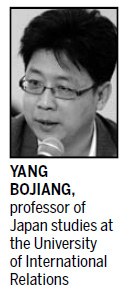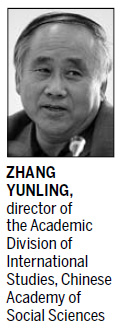View
Diaoyu Islands dispute a watershed
(China Daily)
Updated: 2010-10-27 08:10
 |
Large Medium Small |
Editor's note: The illegal detention of a Chinese fishing trawler's captain and crew by Japan in September triggered a diplomatic row between Beijing and Tokyo, because Japan Coast Guard intercepted the Chinese vessel in the waters off the Diaoyu Islands, which is an integral part of China's territory. Four experts express their views on the dispute and how it can be resolved.
Focus on law of the sea

2009 and 2010 mark a qualitative change in China's development period, as well as its external environment. They can be divided into two parts: One is the relationship between China and the international community and the other, its ties with neighboring countries.
The United States' attempts to interfere in the South China Sea territorial disputes is one of the problems China is facing in its relation with the international community. After the sinking of the Republic of Korea's (ROK) corvette Cheonan, the ROK and Japan both updated their security strategies. An unusual event in Northeast Asia was Japan's participation in the US-ROK military drills as an "observer".
While summoning Japanese Ambassador to China Uichiro Niwa over the illegal detention of a Chinese fishing boat's captain and crew after it collided with two Japan Coast Guard ships near the Diaoyu Islands, China's State Councilor Dai Bingguo urged Japan not to make a wrong judgment of the situation. What Dai meant was Tokyo should not underestimate Chinese people's sentiments toward Japan.
Japan wrongly thought that China's diplomatic front was facing a number of challenges, because of which Beijing might ignore Tokyo's affront. But the fact was beyond its calculation.
China should strike the right balance in its relations with Japan to ensure stable bilateral ties, and promote the solution of major issues between the two neighbors.
If disputes over major issues that have emerged cannot be properly addressed, they could affect sound development of bilateral relations.
We should bear in mind that in the long run China-Japan relations cannot develop in a stable way without solving major issues. It was absurd for Japan to apply its domestic law to the Chinese fishermen because they were in the waters off the Diaoyu Islands, which since ancient times have been Chinese territory.
We have to break Japan's stance that it has no dispute with China over the islands. In fact, in the 1970s Japan was fully aware of and recognized the territorial dispute over the Diaoyu Islands.
In 1978, then vice-premier Deng Xiaoping successfully pushed the two countries to agree to "shelve bilateral disputes and seek common development" on the Diaoyu Islands issue. The two countries abided by the consensus for years.
But since the 1990s, the Japanese government has been insisting that there is no dispute.
While negotiating with Japan, China should pay more attention to law, including the United Nations Convention on the Law of the Sea and the China-Japan Fisheries Agreement.

Tokyo should seek compromise
The United States had played a disruptive role by creating the dispute between China and Japan over Diaoyu Islands.
When the US returned the occupied Okinawa to Japan in 1972, it also transferred the administrative jurisdiction rights of the Diaoyu Islands, which actually belong to China. According to international law, administrative jurisdiction and sovereignty are two entirely different concepts.
Moreover, such jurisdiction transfer is illegal, for it deals with the territory of a third party. So Japan can never have sovereignty over the Diaoyu Islands.
Since Japan has been continually strengthening its control over the Diaoyu Islands, it is not enough for China to only send patrol boats to the islands. Instead, China should continue to modernize its navy.
China definitely wants to maintain stable cooperation with Japan. But considering Japan's actions and the effect of China's countermeasures, Beijing should think of employing another strategy. Of course, the strategy should be based on certain diplomatic principles.
From the perspective of China's rejuvenation, the signing of the Economic Cooperation Framework Agreement between the Chinese mainland and Taiwan has far-reaching effects on Sino-Japan and Sino-US relations, as well as China's relationship with neighboring countries.
The two sides across the Taiwan Straits should consider how to take joint action to safeguard China's sovereignty over the Diaoyu Islands.
We should, through certain channels, make Japan recognize that to reach a compromise with China over the Diaoyu Islands dispute is conducive to the development of Sino-Japanese relations.
Bad for economic ties

The dispute over the Diaoyu Islands and the illegal detention of a Chinese fishing boat's captain and crew by Japan after their vessel collided with two Japan Coast Guard ships near the islands have had a negative impact on Sino-Japanese economic relations.
The impact is even worse than before because China's economic standing is greatly different from it was 30 years ago, when it had just started the reform and opening-up.
Because of the global financial crisis, China's development strategy is to boost domestic demand, instead of relying only on exports. It aims to transfer the economic growth mode to reduce the risks of opening-up.
Japan's economic standing is different, too, the most significant of which is related to China's market. Therefore, the diplomatic and political relations are now affecting the economic world more strongly than before.
The deterioration in economic relations has hurt China and Japan both. But Japan may have suffered more, mainly in areas of service and cargo, direct and indirect investment, and regional economic cooperation. In service trade for example, the premise of their development is cultural exchange and people's emotional identity. The Diaoyu Islands dispute has seriously hurt Chinese people's feelings, which in turn has affected bilateral trade.
Travel and technology trade sectors have suffered the most after the incident. If bilateral relations do not improve soon, the travel trade between China and Japan would see a long-term decline. This will deal a hard blow to Japan, for which travel is one of the major growth areas.
In technology trade, Japan's exports accounted for more than 20 percent of China's total technology import. China imports more only from the United States and the European Union (EU).
For one thing, importing advanced technology from Japan is good for the development of China's economy and technical progress. For another, it is obvious that Japan earns huge profits from the trade. After the ship collisions near the Diaoyu Islands, Japan might become more cautious in exporting advanced technology to China, and China will start looking for substitute exporters.
As far as cargo trade is concerned, some adjustments may be made, for example, in government procurement and exports of strategic supplies. China has its advantages in bilateral trade. But if the risks increase and China's consumers change their preference, Japan would no longer be the third largest trade partner of China.
Japan is one of the major countries with direct investment in China. After the Diaoyu incident, the soft environment is a little different, especially the mentality to attract investments, elasticity of investment policy and the relation between labor and capital. The labor-capital relationship has for long been a big problem with Japanese companies in China, and they can face more uncertainties in the future.
In the field of indirect investment, the Japanese currency rose in the past few months. Economists in Japan believe that was caused by China's purchase of Japanese bonds.
But experts in China consider the cause to be the tightening of financial regulations by the US and the EU, which forced hot money to look for new investment hot spots. Another indirect investment issue is fewer Chinese listings in Japan's security market in the future.
Regional economic cooperation is the important factor binding the two sides. But now it seems cooperation will be influenced by the incident and some agenda, such as joint oil exploration, the Asia-Pacific Economic cooperation conference and the establishment of a China-Japan free trade area, delayed.
Wary of China's rise

The dispute over Diaoyu Islands resurfaced when Japan faced the general election. China's dispute with Japan over the Diaoyu Islands is old, only that Japan has been trying to deny it since the 1990s.
The relationship between China and Japan has changed a lot. A long discussion was held in Japan on how to deal with a rising China. It will take an even longer time for Japan to find a way to coexist with China.
Sino-Japanese relations are marked by four factors. The first is historical. The second is Japan's alliance with the United States. The third is the changes brought about by a rising China. And the last is conflicts in reality, especially the interest in exclusive economic zones, which is behind the dispute over the islands.
According to a joint survey conducted by China Daily and a Japanese NGO, the vast majority of Chinese people don't regard the historical issue as the major factor that creates a impact on bilateral relations. Instead, the conflict in reality is the most important factor.
As soon as US-Japan alliance showed signs of weakening, the US adopted a new strategy of re-strengthening its ties with Japan to continue its domination in the region.
There are always some voices against China's emergence in the international arena, because no other country has had so many unresolved problems during its rise.
Therefore, some people in other countries worry about how China will use its increasing power.
It seems natural to Chinese people that they should become stronger, but some foreigners think China is breaking the status quo and feel uncertain about it. In such a situation, we should adopt a more open attitude.
Moreover, the overall situation of peace for China's development is unchanged and has even improved.